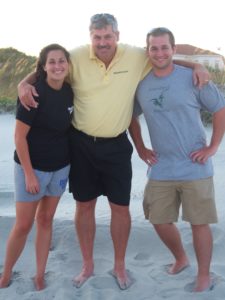Thirty-eight years ago, a funny thing happened on the way to law school for Bruce Brown
As a college student at Appalachian State University in Boone, N.C., Bruce Brown planned on a career in law. To earn money, he worked part-time in the stock room of Watauga County Hospital. After graduation, he took a job with a local distributor, Roane-Barker (now Henry Schein), as he was attracted to medical sales. His plan: Work for a year, then start law school.
“We were at the height of the recession in the 70s,” he says. “As I would stop at phone booths to make calls, I’d look through the Yellow Pages and see all the lawyers in there. There were tons of them in every town.” He started wondering about his prospects in the profession. At the same time, he found he really enjoyed medical sales. “I didn’t want to change,” he says. Thirty-eight years later, he’s still doing it, with Henry Schein.
“I liked the freedom, meeting people,” he says of those first years in the field. “I was in a rural North Carolina territory.” He didn’t know much about medical products when he started, but found that the office managers and nurses in the offices on which he called were more than willing to take the time to train him. “People had more time then,” he says.
“When I started, it was all on-the-job training. My manager rode with me on two calls, then he left. Today, if you go into an office and don’t know what you’re talking about, they won’t give you any time at all. Everybody’s too busy.”
True, it was easier to get to decision-makers then, says Brown, who now covers Greensboro, N.C., for Henry Schein (after making a stop at Southeastern Hospital Supply, which later became Bergen Brunswig and then, Cardinal Health). But reps of that era will remember the difficulty in carrying out what today are simple tasks, such as hunting down the odd product for a customer.
“There weren’t any computers, so if you needed a light bulb for an odd light, you had to call it in, and if nobody in the office could find it, that was it. Now, you can find anything.”
What’s more, most communication between the sales rep and customer was face to face, not text or email. “I don’t know if selling was harder or not,” he says. “I think it was just different.” Today, he takes advantage of electronics, and follows the lead of his customers, but he still believes in the value of face-to-face meetings.
Of course, most physician practices 38 years ago were independent; today, many have been acquired by health systems. And while that has made the rep’s job more challenging, he cautions reps not to be too intimidated to make that call and introduce the practice to new technologies. “There are still opportunities in a lot of the larger practices. You’re not necessarily locked out of them. It might take longer to get the business or the sale, but it’s possible.”
Though business is conducted much differently than it was when he began his career, Brown says reps need to remain confident that they have much to offer their customers. “Our customers need someone to help them with information, optimize revenues and stay educated in the industry. They will have a hard time navigating all the information they need.
“If we can help them do that, they’ll appreciate it.”
